Bulbs for spotlights: types, characteristics, nuances of choice + the best brands
Agree, the first lighting device you come across should not be installed in plasterboard structures, suspended ceilings, furniture elements and other objects. We need light bulbs for spotlights located in hard-to-reach and poorly ventilated places. Which type of light bulbs and manufacturer should you prefer?
We will help you make your choice - the article discusses the main types of lamps used for installation in spotlights. Their advantages and disadvantages are given, and useful recommendations are given for choosing the optimal lighting device, taking into account its future location.
We have also selected visual photographic materials and video tips that will help you purchase a light source with good performance characteristics and minimal heating. A properly selected device will provide high-quality lighting to the desired areas and comply with fire safety parameters.
The content of the article:
Varieties of suitable light sources
Spotlights use traditional incandescent, halogen, energy-saving and LED lamps. Typically the instrument body is configured to specific base and, based on these parameters, a suitable light bulb is selected for it.
What type it will be depends on the comfort and fire safety requirements for the lighting system, as well as the desired effect and the amount the buyer plans to spend.
No. 1 - pros and cons of incandescent lamps
An ordinary light bulb provides soft, pleasant light in a warm tone and does not tire the eye even with prolonged illumination. The bulb containing the filament is made of heat-resistant glass and has good transparency.
Transmits almost all the light energy produced. It is inexpensive and easily replaced with a new one if it burns out.
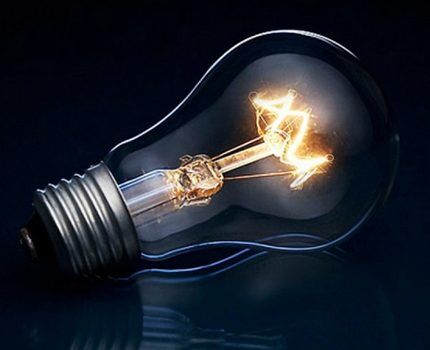
The first big disadvantage of the device is the lowest level of efficiency, amounting to only 5-15% depending on the power. In second place is the record high consumption of electrical energy, forcing owners to pay high utility bills when actively using incandescent lamps for lighting.
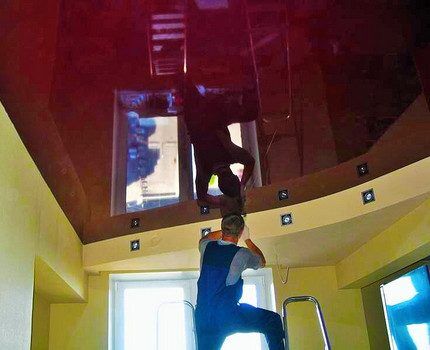
It is possible to use such bulbs in spotlights, but it is not very convenient due to their large size.
To properly hide the light source, a good depth of stretch ceiling or plasterboard structure is required, or the surface-mounted lamp must have a voluminous, capacious shade that completely hides the luminous element.
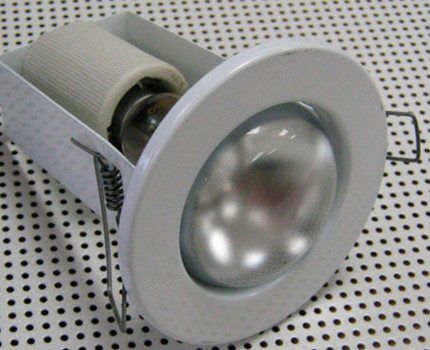
Incandescent light bulbs are generally not suitable for embedding into furniture or other flat surfaces due to their relatively large dimensions.
No. 2 - advantages and disadvantages of halogens
Halogen options are more progressive light sources. They are superior to classic ones in all respects. incandescent light bulbs, having twice the service life. Therefore, their use in the lighting system turns out to be more practical and economical.
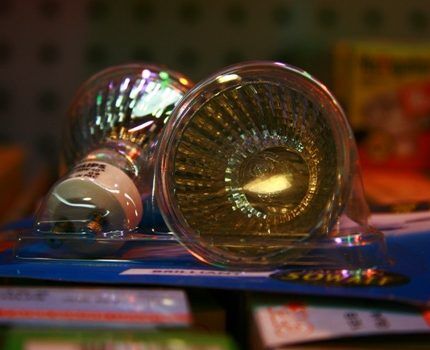
However, users who choose these devices for spotlights should be aware that for correct and stable operation, halogen lamps require a stable voltage.
Any changes that occur in the network affect halogen lamps in the worst possible way and reduce the operating period by up to 40%. In addition, there is a significant decrease in light output, which also cannot be considered an advantage.
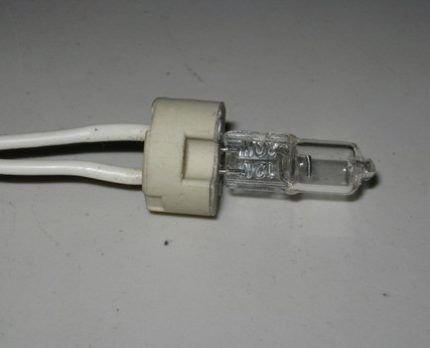
If halogens are selected for the spot lighting system, it is necessary to mount them transformer, which reduces the mains voltage to the values consumed by the devices.
This will extend the life of the lamps, since the main percentage of burnout occurs precisely at the moment of switching on. This equipment can be installed for each individual lighting fixture or for the whole group at once.
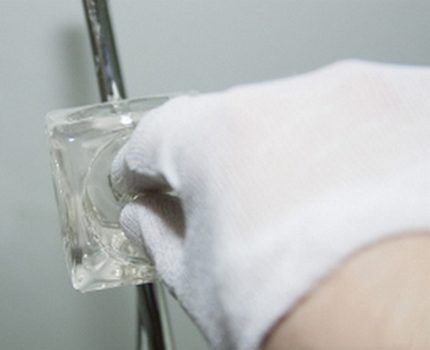
Among the main disadvantages of halogen products is excessive heating during operation. This significantly limits the scope of application of spotlights with such modules and reduces their level of popularity.
No. 3 - nuances of operation of energy-saving products
Energy-saving lamps perform well in spotlights and satisfy all basic needs.
6 times lower consumption of electrical energy compared to incandescent lamps makes them not only attractive, but also beneficial for arranging even a very large lighting system designed for a spacious, large room.
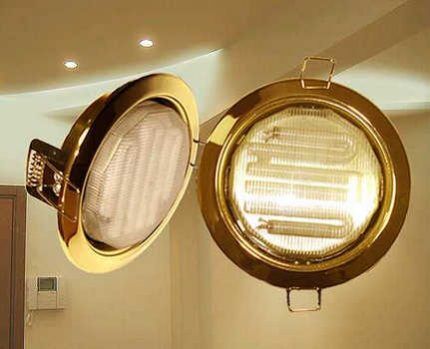
The service life of energy-saving devices is very impressive and is 5-7 times longer than halogen ones. When purchasing light bulbs, you can count on the fact that they will last up to 10,000 hours and will provide a stable, non-irritating flow of light in any living or working space.
Among the variety of bases, you need to look for the marking GU10 or GU5.3. These options are the most common and are produced specifically for spotlights.
No. 4 - LED features
LED light bulbs have a wide range of useful and practical advantages.
Among them are such positions as:
- minimal energy consumption;
- high mechanical strength;
- lowest operating temperature of the case;
- low sensitivity to on/off cycles;
- operational durability.
Thanks to these qualities, LEDs are very popular and are confidently displacing many other light sources from the market.
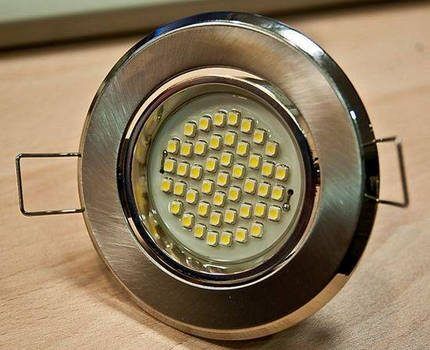
For installation in spotlights for suspended ceilings, these devices are considered the most preferable. The minimum profile height makes it possible to install them even where, due to the structural features of the structure, there is very little free space between the decorative finishing and the ceiling itself.
During operation, the housing of LED lamps heats up extremely little. This factor allows them to be used in structures made of fire-resistant materials.
Light flux supplied LED devices, has good density and saturation. The generated beam is distributed evenly and does not create glare spots either on the floor or on any other illuminated surface.
Additionally, diode lamps are equipped with sealing parts and are suitable for use not only in places with high humidity, but even in spotlights installed underwater in swimming pools or decorative aquariums.
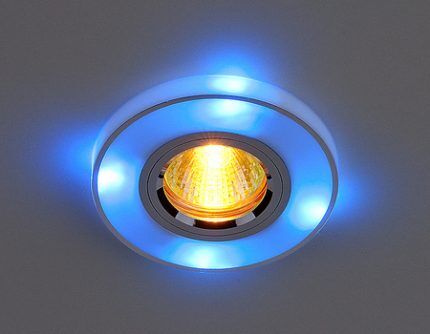
The range of LED devices is so wide and varied that choosing a suitable lamp of the most extraordinary design is not difficult.
Products are available in a wide range of powers and color temperatures. This allows you to implement any exotic and unusual lighting solution in the room, which is absolutely impossible to implement with other types of lamps.
The only disadvantage of LEDs is the rather high initial price, especially for branded products that have proven themselves in the market for lighting equipment and related elements. True, over time it is more than compensated for by the economical consumption of electrical energy, almost 10-12 times less than that of traditional incandescent lamps.
What should you consider when purchasing?
Immediately before purchasing, you first need to determine the purpose of the lighting system and intended use.
There are only two options here:
- Creating Main Lighting, designed to bring light flow to all corners of the room.
- Backlight. Implementation of a design solution, that is, provision of background lighting for individual interior elements, zoning of space, etc.
In the first case, it is better to opt for powerful devices available for installation in ceilings, walls, floors, enfilades and staircase structures. This will make it possible to create a bright, saturated light that smoothly envelops the entire room and gives it community and integrity.
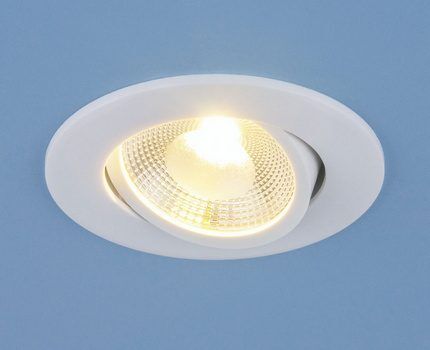
For background lighting and decorative lighting, low-power light sources with different temperature ranges are needed.
With their help, it will be possible to highlight certain interior details and divide the living or working space into zones. And also highlight paintings hanging on the walls or beautifully highlight sculptures, floor vases or any other original elements of decorative style.
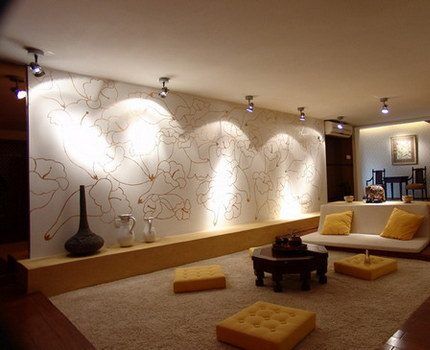
Spot lighting of suspended ceilings requires a special approach. The material from which they are made has poor heat resistance and, when exposed to high temperatures above 50 degrees, can turn yellow, stain, crack and lose elasticity.
To avoid these troubles, you need to install the lamps correctly and choose lamps that are optimal in terms of power. Experts advise installing halogen or diode lamps in such systems.
They provide high-quality light flow, but at the same time they heat up less and do not have a negative impact on the ceiling material.Another point to consider is the power limitation.
The maximum indicators here are the following figures:
- 35 W – for halogens in a fixed lamp and 40 W in a mobile one;
- 50 W – for luminescents;
- 50-60 W for incandescent lamps.
In addition, it is necessary to take into account the shape of the selected lamps and select the lamps so that they fit the body in size, and do not stick out from the lampshade, creating an uncomfortable stream of light that hits the eyes.
TOP list of the best brands of light bulbs
The market for lighting equipment and related elements is developing very actively. Promising newcomers from the CIS countries and China, who have only recently begun producing high-quality light sources of various types and types, are actively competing with recognized European brands that have been offering their products to customers for decades.
Among the variety of brands, the TOP 7 have been identified, whose products, created for spotlights, sell out the best and cause the least amount of complaints.
No. 1 - offers from Philips
Philips is a recognized global market leader in the progressive lighting segment. Possessing rich experience, production potential and an extensive scientific knowledge base, the brand produces a full line of lamps suitable for installation in spotlights.
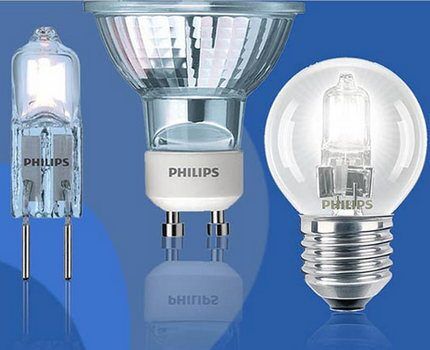
The list of products offered by the brand includes incandescent modules of various shapes, equipped with bases of popular sizes and reflectors to create diffused light.
The company makes halogen lamps with and without a reflector for 220 V and 12 V. Philips LED products offers in a wide variety of configurations. Choosing a suitable model among them is not at all difficult, even if the spotlight has an original, non-standard design.
No. 2 - Osram product line
Osram is one of the oldest, most experienced and respected players in the market. Among the products of the German brand there are any types of devices suitable for spotlights - from traditional Edison lamps to progressive and economical LED lamps of any power.
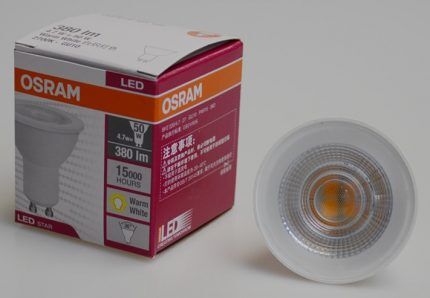
Diode lamps are available in all popular types of sockets and are suitable for sockets and housings of various types and configurations. Provide good luminous flux in a wide range of shades from the warmest to the coolest.
Halogen lamps are available both with and without reflectors and guarantee sparkling, eye-pleasing lighting with different beam dispersion angles. They help to enliven the atmosphere in the room and allow you to create accent spots that give the interior solution a bright personality.
Integrated energy saving light bulbs from Osram are built into structurally diverse luminaires and effectively replace incandescent modules that consume large amounts of electricity.They are sold at a reasonable price and, according to customer reviews, are reliable and operationally stable.
No. 3 - specificity of the Gauss brand
The Gauss trademark belongs to the Vatron company, registered in Russia. This is a relatively young manufacturer that has already made a name for itself by creating high-quality lighting products. The company does not produce incandescent lamps and specializes in the production of only modern and advanced light sources.
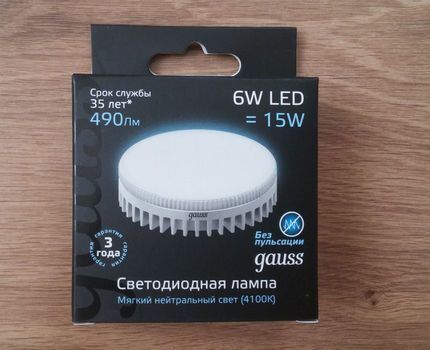
In addition to the lamps themselves, the Gauss brand produces spotlights made in a wide variety of design solutions. If desired, the client can complete the entire lighting system in the house only Gauss products, which together will ensure the most correct operation.
Another fairly young Russian manufacturer, offering a wide range of lamp products of different types at an affordable price. It has a modern enterprise in Klin, equipped with advanced equipment.
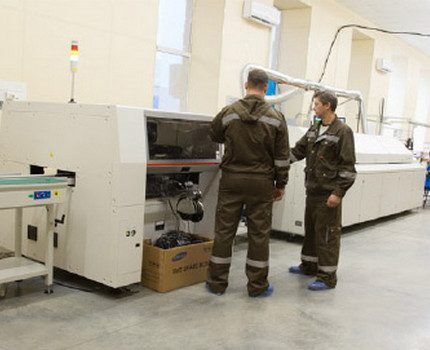
It actively introduces innovative technologies into production and produces light bulbs for spotlights that meet all European requirements.It sells its products in Russia, the CIS countries and some EU countries.
Users note the decent quality of Navigator products, adequate cost and the company guarantee that the company provides for all types of light sources, except incandescent lamps.
No. 5 - Era company
The products of the Russian company Era occupy a niche in the market for budget lighting elements and offer users products that meet technical parameters, GOSTs and European certificates.
The company's pricing policy is to provide the client with high-quality and aesthetically attractive lighting fixture Era at a reasonable cost.
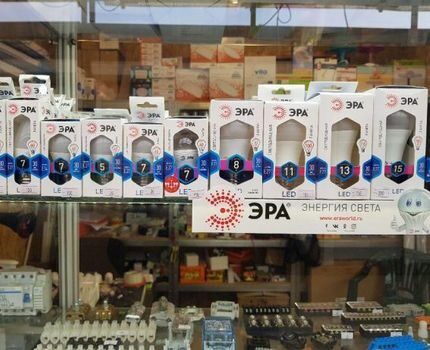
For spotlights, Era produces inexpensive incandescent elements, compact halogens with and without reflectors, and a wide range of LEDs, represented by several budget and one premium series.
No. 6 - a few words about the “Chinese”
Chinese lighting products occupy a fairly large market segment and create serious competition for both Russian and European brands.
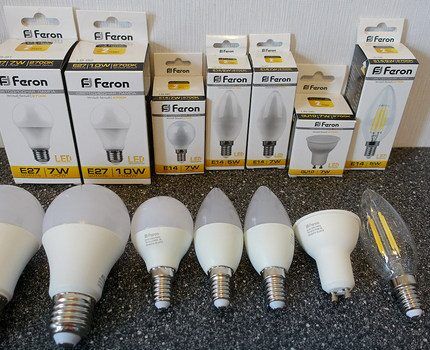
Among all the trademarks of the Celestial Empire, it deserves the greatest attention Feron, Electrum, Voltage, Canyon and ELM.
These enterprises have proven themselves well and managed to attract customers with a harmonious combination of reasonable prices and decent quality of their products.
Conclusions and useful video on the topic
Video #1. Which lamps for spotlights should you prefer? Comparison of halogens and LEDs:
Video #2. How to properly replace a light bulb that has stopped working in a spotlight type lighting fixture:
Video #3. Which LED lamps are better for spotlights and why:
When choosing light bulbs to create spot lighting, you should take into account the design of the lamp, its location and the basic requirements for fire safety. Focusing only on cost and buying the cheapest devices is unwise.
They have a short service life and consume a lot of electricity. But initially, more expensive devices work much longer and use resources economically, providing lighting that is pleasant to the eye.
Tell us about how you chose light bulbs for installation in spotlights. Share the criteria that were decisive for you personally. Please leave comments in the block below, place photos in it on the topic of the article, ask questions on controversial and interesting points.
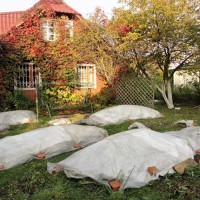
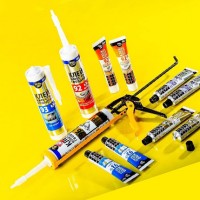
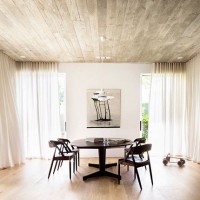
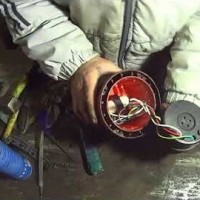
Spot lighting is now a modern trend in interior lighting design. But you need to remember that such spotlights need to be installed competently and competently in order to avoid such a disaster as fire. Therefore, you need to be savvy in this matter, or entrust the installation to a real electrician.
Therefore, we must strive to ensure that the lighting is as reliable as possible, in addition to being beautiful and economical.
Yulia, it’s not all that complicated) In fact, an electrician does not need superpowers to install lamps correctly.It is enough for the master to have a minimal understanding of how it works and follow basic electrical safety rules. The question, rather, is not about competence, but about the accuracy and conscientiousness of the one who undertakes to do this work.
Now it will be easier to decide on the choice of lamps and light bulbs in the store thanks to the presented rating of the best brands. I understand that it is better to contact specialists, but I would also like questions such as how many spotlights are needed for a given area of the room, what lighting standard is established for it (approximately).
Good day, Natalia.
The number of spotlights and light bulbs can be determined using a rough method based on sufficient average illumination per square meter of living space (the purpose of the room is not taken into account) with a certain type of light bulb. The methodology assumes that one 20-watt incandescent lamp or 6-watt fluorescent or 3-watt LED lamp is enough per square meter. I have attached a screenshot of a table that helps calculate the power of a lighting fixture or fixtures.
More accurate results can be obtained by focusing on illumination standards for various rooms - I have attached a screenshot of the table. By multiplying the illumination rate by the area of the room, you get the required total luminous flux. Dividing it by the flux value of a single lamp from the first table, you get the number of lamps.
In reality, calculations require taking into account many factors, which result in a “complex formula”. Lighting calculations take a whole semester at electrical engineering universities, so I don’t explain the professional methodology.
It seems to me that now there is no point in considering any options other than LEDs. Economical, reliable, fireproof - they win in all respects.